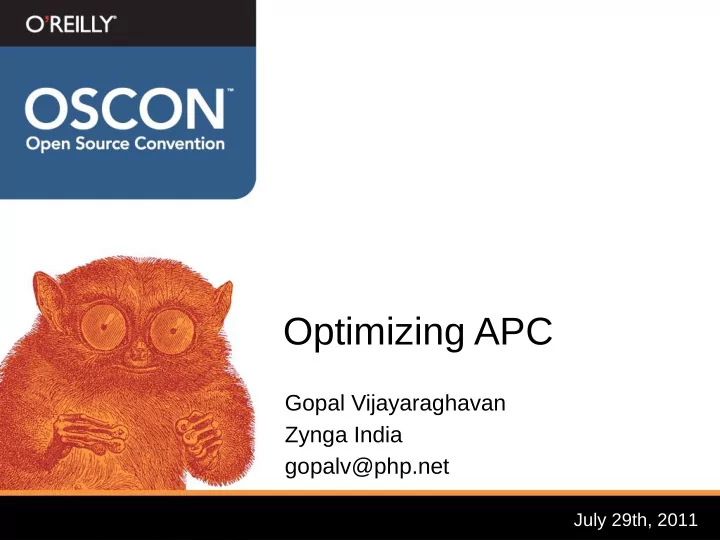

Optimizing APC Gopal Vijayaraghavan Zynga India gopalv@php.net July 29th, 2011
So, what's this talk about ? http://flickr.com/photos/frogmuseum2/238601344
A Retrospective http://www.flickr.com/photos/childofwar/3097124543/
What Changed? http://www.flickr.com/photos/thomasthomas/258931782
Virtualization and cpu-0 http://www.flickr.com/photos/helico/404640681
Cache Surplus http://www.flickr.com/photos/mukumbura/4052671706
Devil is in the Details http://www.flickr.com/photos/mar00ned/126871387/
Allocator fixes - apc_sma_free() was taking too much time - This is now a doubly linked list structure - This makes allocate() slower - But the deallocate is our bottleneck - Entire user cache locks up during deallocs - This fix lets us run caches so close to 100% - Basically, worry about cache flushes no more - Fragmentation is far less of a headache
T weak Pool Allocation - APC-3.1.x branch saw a new pool allocator - Pools were either small, medium or large - Pools did away with book-keeping pointers - No more memory leaks from forgotten free()s - No locks unless the pool has filled up - Look back only 8 items, not the whole pool - Increase pool block size (by size allocated so far) - This does speed up everything to do with memory
Pluggable Serializers - Igbinary can be used instead of php serializer - Igbinary is a far more compact format - Reduces memory churn for large arrays - Is faster to unserialize than php serializer - apc_register_serializer() api - Write your own serializer in another ext - Pure runtime hooks, no need to link to apc.so
Read/Write Locks - RW locks - Refcount++ does not need a lock - Needs atomic inc/dec from gcc to use - Slows down single-threaded execution - Speeds up parallel execution - Pthread lets you prefer writers or readers - Uses writer preferred by default - So it speeds up apc_store() as well
Upgrade Locks (FAIL) - Attempt to create URW locks - Upgrade() turns a read lock into a write lock - Works fine - Makes code slower than mutexes - During a cache slam, all of them turn into writers - Was more complicated to debug
Slam Detection for apc_store() - Throw out duplicate inserts before locks - What do we throw out? - Any parallel write with the same hash - One second granularity - Fixes heavy writes on cache-clear - Reduced locking - Stabilizes faster - Reduces fragmentation in memory
Benchmarks - What do we expect to change - Straight line speed - read/write - Concurrence - read/write - Memory efficiency - http://notmysock.org/code/apc-torture.tgz
APC memory sizes 350 300 250 MB per 100,000 small arrays 200 150 100 50 0 Old New APC New APC + serialize RW Locks + igbinary
Size per Item 35 30 25 20 MB 15 10 5 0 old new-php new-igbinary
Read Concurrency (test3) 3000 2500 2000 Milliseconds for 100,000 reads Old 1500 New APC New APC + serialize RW Locks + igbinary 1000 500 0 x1 x4 x8 x16 x32 Concurrency
Time to Read 160 140 120 100 80 60 40 20 0 old new-php new-igbinary
pecl/hidef hits stable - APC isn't the only horse in this stable - For read only data – hidef is preferred - Does not hit the php memory_limit as hard - Zero locking - Hidef's worst-case performance matches APC's best-case performance - Will not have data corruption due to a crashing process
Any questions ? - Resources - http://pecl.php.net/package/APC - http://pecl.php.net/package/hidef - And thank you for listening !
Thanks to Zynga - For supporting my work on PHP & APC - Giving me time off to come talk here - And Zynga's hiring php programmers! - http://www.zynga.com/jobs
Recommend
More recommend